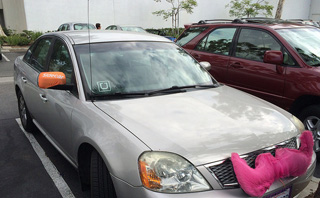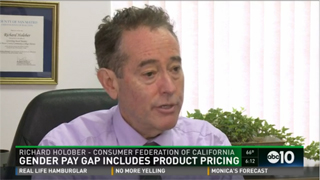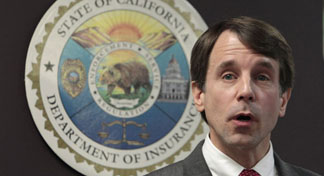Category Archives: Latest In Consumer News
Uber And Lyft Have Devastated L.A.’s Taxi Industry, City Records Show
by Laura J. Nelson, Los Angeles Times

Since the ride-hailing services began operating in Southern California three years ago, the number of L.A. taxi trips arranged in advance has fallen by 42%, according to city records, and the total number of trips has plummeted by nearly 30%. … The decline mirrors what’s happening across the country. … In San Francisco, the corporate home of both Uber and Lyft, the number of trips taken per taxi dropped by more than two-thirds over a two-year period. Read More ›
Gender-Based Price Differences Could Be Banned
by Allen Young, Sacramento Business Journal

Senate Bill 899 passed the Senate Judiciary Committee along party lines this week and now heads to the Senate floor. … Female consumers pay 7 percent more on average for products that are essentially the same as the male version, according to a study released in December by a public consumer watchdog agency in New York City. The study looked at 800 consumer products with “clear male and female versions” and found that products targeted toward girls and women were more expensive 42 percent of the time. Read More ›
Gender Pay Gap Includes Product Pricing
by Gabrielle Karol, ABC10, Sacramento

The Consumer Federation of California sponsored [SB 899], which was authored by State Senator Ben Hueso (D-San Diego). The bill’s motivation is a December report from New York’s Department of Consumer Affairs. In the report, nearly 800 products are compared at two dozen different retailers. Forty-two percent of the time, women’s products are priced higher than men’s products. The so-called “pink tax” means shoppers are paying an average seven percent more for items targeted to women. Read More ›
Health Apps: Unlimited Promise Or ‘Like Having A Really Bad Doctor’
by Soumya Karlamangla, Los Angeles Times

More than 165,000 [apps] involving health and wellness [are] currently available for download — a blending of technology and healthcare that has grown dramatically in the last few years. Experts see almost unlimited promise in the rise of mobile medical apps, but they also point out that regulation is sometimes lagging the pace of innovation, which could harm consumers. … Federal regulators say certain higher-risk apps — such as those that perform EKGs or measure blood glucose levels — must be approved by the Food and Drug Administration before reaching the market. Apps considered less of a risk … won’t face much scrutiny from the FDA. Read More ›
Uber Agrees To Settle DA Suits Over Safety Practices
by Jason Doiy, The Recorder

Uber Technologies Inc. will pay up to $25 million to settle a lawsuit brought by the San Francisco and Los Angeles district attorneys’ offices over how it has touted safety measures. … Uber agreed to change the way it describes its driver checks and safety practices and to cooperate with the Division of Measurement Standards to certify that ride charges are accurate and fair. [The complaint claimed] the San Francisco-based ride-hailing company misled consumers by advertising the “safest rides on the road,” coupled with “industry leading background checks.” Read More ›
Wells Fargo Must Pay $203M To Customers After Supreme Court Rejection
by Ashlee Kieler, Consumerist

In 2010, the judge in the case ordered the bank to pay the $203 million to customers of Wells Fargo who were affected by the overdraft policy between Nov. 2004 and June 2008. … At issue in the appeal to the Supreme Court was whether or not previous courts were right to certify the class action even though the class included individuals who were not harmed by the company’s conduct — in this case Wells Fargo allegedly making misleading statements to checking account customers about how their transactions would be posted and the likelihood that an overdraft would result. Read More ›
CFC Applauds FCC Move To Protect Broadband Privacy
“Today’s vote is a significant advance for privacy protection. Consumers should decide whether their online activities and other personal data are shared with third-party strangers,” CFC Executive Director Richard Holober said. “It is essential that any final FCC rule prohibits broadband carriers from charging extra for privacy. Privacy is a right that should not be available only to the wealthy.” Read More ›
Wells Fargo To Pay $8.5 Million In Privacy Case, None To Victims
by Kathleen Pender, San Francisco Chronicle

[Penal Code sections 632 and 632.7] make it illegal to record phone conversations without the consent of all parties. Violators can be fined up to $2,500 per call or imprisoned in a county jail. … “This is very different from the kinds of settlements I have seen brought by private attorneys representing consumers” in class-action cases alleging violations of California’s eavesdropping law, said Richard Holober, executive director of the Consumer Federation of California. “In those kinds of lawsuits, individual class members typically can receive hundreds or thousands of dollars if they submit a claim. This involves zero recovery by individual class members.” Read More ›
California Insurance Commissioner Expresses Skepticism Over Anthem-Cigna Merger
by Ana B. Ibarra, KQED

“We are not aware of any peer-reviewed studies that have found that higher insurer market concentration has led to lower health insurance premiums,” [one expert] said. … Consumer advocates said the acquisition would make existing problems with health insurance worse. Anthem, they claimed, has already struggled with inaccuracies in provider directories, low quality ratings and poor management of grievances. Read More ›
Broadband Industry: It’s Unfair If Facebook Can Collect Your Data, But AT&T Can’t
by Kate Cox, Consumerist

Later this week, the Federal Communications Commission will be voting on a proposal intended to protect some of your personal data from being shared by your Internet service provider, by requiring that the ISP first get your permission. … ISPs are the conduit for everything you do online, meaning they have access to a lot of potentially sensitive information about you … data about what sites you visit. When. For how long … Read More ›
Corinthian Colleges Students Unlikely To See $1.2 Billion Judgment
by Roxana Kopetman and Mark Muckenfuss, Orange County Register

Experts said recovery of the judgment is unlikely. And some students and their advocates said they haven’t yet gotten what they really need: release from school-loan debts. In California, 13,000 students were attending Corinthian schools when the doors shut. … The bankrupt Corinthian closed its for-profit schools last year amid accusations that the chain falsified grades, attendance and job-placement rates. Students complained of deceitful practices that often targeted low-income students by promising a lot but offering very little. Read More ›
Got A Health Care Grievance? There’s A Place To Complain
by Claudia Buck, Sacramento Bee

[MyPatientRights.org is] intended to provide an easy link to the state Department of Managed Health Care, which handles consumer complaints with the state’s 122 licensed health plans. … Last year, the help center received more than 102,000 requests for assistance. … Requests for help jumped by 60 percent compared with 2013, largely because of the implementation of the Affordable Care Act, according to the department. Read More ›
Lyft Drivers, If Employees, Owed Millions More – Court Documents
by Dan Levine and Heather Somerville, Reuters

Drivers who worked for ride-hailing service Lyft in California during the past four years would have been entitled to an estimated $126 million in expense reimbursements had they been employees rather than contractors, court documents show. … The judge asked for the estimates as part of his oversight of a proposed settlement of a class-action lawsuit filed by California drivers. … Lyft agreed to settle the class-action lawsuit in January. Under the proposed deal, Lyft would pay $12.25 million, with drivers receiving an average of $56 each after attorneys’ fees and other expenses, documents show. Read More ›